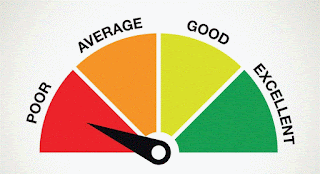 |
| Credit Score |
After a series of financial setbacks, Eddie’s income is on the upswing. But that doesn’t seem to be helping his credit scores one bit. He wrote in an email asking why it didn’t:
I bring home $650 a month MORE than when I worked, and my monthly outlay is $700 less, so I have $1,350 more disposable income every month than I had when I had all that debt. Yet I can’t get a freakin’ credit card?
Why doesn’t income affect your credit scores?
“As important as it is to understand what does impact your credit score, it’s important to also know what isn’t included,” says Sarah Davies, Senior Vice President, Analytics for VantageScore Solutions LLC. “Income does not impact your credit score. Other things that do not impact credit scores are race, color, religion, nationality, gender, marital status, age, occupation, title, employer, employment history, where you live, or even your total assets.”
She goes on to explain that “a credit score is designed to determine the likelihood that you may default on a credit account. In other words, just because someone might earn more money than another person does not necessarily make them more or less risky.”
Why not? Credit scores are calculated using the information in credit reports, and verifiable information about income isn’t listed there. The major credit reporting agencies rely on data reported by third parties (creditors and public records), not “self-reported” data supplied by consumers. Where would they get accurate income information for every person in their databases?
Employers aren’t going to supply it. Tax records might be a possibility, but since your tax data is confidential, you would first have to agree to allow the IRS to share your data. Going a step further, if taxpayer income was provided to credit reporting agencies, there would have to be a mechanism in place to handle disputes if you believed the income reported was incorrect — and it’s hard to see how the government would want to get involved with that.
How Income Is Used
The bottom line is that income isn’t part of your standard credit score.
While that may bother high earners or those, like Eddie, whose incomes are on the upswing, overall it is probably a good thing. You can be self-employed — or even unemployed — and that doesn’t hurt your scores one bit, provided you can still pay your bills on time. Anyone who works for themselves and has tried to apply for a mortgage in the past couple of years knows how difficult it can be to prove your income to a lender.
That doesn’t mean income is irrelevant. It’s not. In fact, all lenders will ask you what you earn on your application, and they may have a minimum income requirement. Some lenders will accept the number you report as long as it appears reasonable, while others may require you to document what you earn with copies of your paystubs, tax returns, or even by directly contacting your employer to verify your income.
With that number, the lender can calculate a debt-to-income ratio based on the income you have reported. They may even use a custom application score that factors in how much you make. “Lenders, on the other hand, may take income into consideration as they can make more subjective decisions as to whether to loan you money, how much, and under what terms,” Davies points out.
At least one consumer organization, the Consumer Federation of America, says there is a link between credit scores and income. In their report, “The Use of Credit Scores by Auto Insurers: Adverse Impacts on Low- and Moderate-Income Drivers,” they maintain that lower and moderate-income drivers are more likely to have lower credit scores “due to economic circumstances.”
“Income affects your credit, but not your credit score,” explains Steve Ely, president of eCredable.com, a firm that helps consumers establish credit using bills that don’t show up in traditional credit reports. “When lenders make decisions about your creditworthiness, income is always a key consideration. They don’t want to lend money to someone who obviously can’t afford to repay it. Your credit score is a key factor that helps them understand how you’ve behaved in the past (when it comes to meeting your financial obligations), and are likely to behave in the future.”
This means that just because you have a high income you may not have an excellent score, and even with a modest income, your credit score could be stellar. The only way to know is to check your credit scores, which you can do for free at Credit.com.









